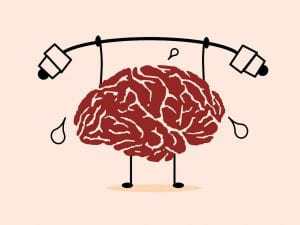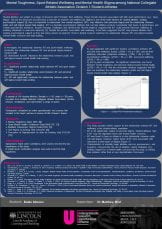By Eadie Simons
 Mental toughness (MT) is a desirable psychological attribute that can help athletes produce consistently high levels of performance and sustain goal-directed behaviour, despite everyday challenges and stressors [1]. Research suggests that the qualities associated with MT such as perseverance and buoyancy could promote wellbeing by enabling athletes to overcome adversity [2], as well as hindering support seeking due to the fear of being viewed as weak [3]. This project had three aims: (i) investigate the relationship between MT and sport-related wellbeing, (ii) identify the relationship between MT and personal stigma toward mental health, and (iii) understand how MT influences the relationship between public and self-stigma toward mental health help-seeking.
Mental toughness (MT) is a desirable psychological attribute that can help athletes produce consistently high levels of performance and sustain goal-directed behaviour, despite everyday challenges and stressors [1]. Research suggests that the qualities associated with MT such as perseverance and buoyancy could promote wellbeing by enabling athletes to overcome adversity [2], as well as hindering support seeking due to the fear of being viewed as weak [3]. This project had three aims: (i) investigate the relationship between MT and sport-related wellbeing, (ii) identify the relationship between MT and personal stigma toward mental health, and (iii) understand how MT influences the relationship between public and self-stigma toward mental health help-seeking.
One of the biggest challenges for this project was the recruitment process. This relied on head coaches of National Collegiate Athletic Association (NCAA) Division I teams for a select number of sports forwarding our questionnaire to their athletes. My supervisor and I spent hours compiling the contact details of around 1000 head coaches for the initial contact email, only to receive a small number of completed surveys. This was quite disheartening, but we were soon able to recruit additional participants after deciding to widen the number of sports we reached out to.
was the recruitment process. This relied on head coaches of National Collegiate Athletic Association (NCAA) Division I teams for a select number of sports forwarding our questionnaire to their athletes. My supervisor and I spent hours compiling the contact details of around 1000 head coaches for the initial contact email, only to receive a small number of completed surveys. This was quite disheartening, but we were soon able to recruit additional participants after deciding to widen the number of sports we reached out to.
This minor setback made me realise that the research process is not as straight forward as we are made to believe. However, it added to the lessons learnt from this experience, specifically the importance of remaining open minded and adaptable. This was reinforced at the data analysis stage when two of our hypotheses were unsupported. Having to propose new links between concepts in order to understand our results was very insightful.
 Participating in UROS has been an invaluable opportunity to gain first-hand experience of research outside of my degree. The support and guidance from my supervisor throughout this whole process has allowed me to gain a lot more from this than just carrying out a research project. This experience will not only be beneficial for moving forward with my dissertation this year, having improved my academic writing and research skills, but has also given me ideas for research should I decide to take on a Masters or PhD in the future.
Participating in UROS has been an invaluable opportunity to gain first-hand experience of research outside of my degree. The support and guidance from my supervisor throughout this whole process has allowed me to gain a lot more from this than just carrying out a research project. This experience will not only be beneficial for moving forward with my dissertation this year, having improved my academic writing and research skills, but has also given me ideas for research should I decide to take on a Masters or PhD in the future.
References –
1 – Gucciardi, D. F., Hanton, S., Gordon, S., Mallett, C., & Temby, P. (2015). The concept of mental toughness: Tests of dimensionality, nomological network, and traitness. Journal of Personality, 83, 26-44.
2 – Gucciardi, D. F., Hanton, S., & Fleming, S. (2017). Are mental toughness and mental health contradictory concepts in elite sport? A narrative review of theory and evidence. Journal of Science and Medicine in Sport, 20, 307-311.
3 – Bauman, N. J. (2016). The stigma of mental health in athletes: are mental toughness and mental health seen as contradictory in elite sport? British Journal of Sports Medicine, 50, 135-136
*To view Eadie’s research poster and presentation recording, please click on the thumbnails below:


